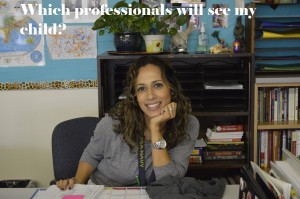When you have a child with a speech and language difficulty (or any other kind of additional need for that matter) you can start to come across a confusing array of different professionals who all advise on different things. Does your child need to see all these people? Is there anyone who may be able to help who you don’t know about? What do all these confusing job titles mean anyway and what is the difference between them? We thought we would try and explain today what some of these professionals do.
Now, before I start, let me just say that I am in no way implying that your child needs to see all (or any) of these people. We are just trying to help you know what different services do in case someone suggests that a particular professional may be able to help your child.
Health Visitor
If you have any concern about a preschool child’s development, your Health Visitor is often a great place to start with checking out how they are getting on and whether they need any onward referrals. Health Visitors will give you some idea of where your child’s development is in relation to what is expected at their age and let you know what services are out there if you need to access any support.
Speech and Language Therapist
If your child has speech and language difficulties, this is likely to be one of the first professionals you are referred to. Speech and language therapists can help with all sorts of different aspects of communication. If your child has a stammer or their speech is not clear, it may be obvious that speech therapy can help. However, if your child is talking in sentences but not following instructions, for example, it may be less obvious how speech therapy can help. We work with children with difficulties with understanding, expressive language, speech clarity or social skills. You can find out more about what a speech and language therapist does by looking at this post.
Audiologist
An audiologist will assess your child’s hearing. Often, if there are concerns about speech, a referral to audiology will be suggested to rule this out as the cause of the difficulty. Even if you haven’t noticed your child having difficulty with hearing, it’s still really worth getting their hearing checked. Problems such as glue ear can come and go, and be quite difficult to spot.
Occupational Therapist
An occupational therapist helps people with tasks associated with everyday living. Examples of the sorts of things they might help a child with are feeding, dressing, play activities (such as riding bikes, climbing etc), organisational skills, sensory skills, balance and co-ordination. I’m sure there is also lots more that I have missed out!
Developmental Paediatrician
If it is thought that your child may benefit from several different services, or there are concerns about their development in a variety of areas, they may be referred to a developmental paediatrician. If any formal diagnosis needs to be made, the paediatrician will usually be the one to make that diagnosis, and they may refer on to other services and/or monitor your child’s progress over time to see how their development is progressing.
Portage
Portage are a fantastic service. They will visit preschool children at home and offer support and advice to the family and educational activities to help with all aspects of development. There is also a service called Portage Plus which focusses on behaviour support.
SENCO
Each school and nursery has a SENCO. This stands for Special Educational Needs Co-Ordinator. They will advise other staff on anything different they need to do to help your child, collate and co-ordinate any assessment and paperwork and track your child’s educational progress.
Specialist Teachers
Many areas have specialist teachers or support workers who can come in and advise staff on how to support children with specific needs. These may include specialisms such as hearing impairment, visual impairment, language and literacy, EAL (English as an additional language), behaviour support etc. Exactly what is available is likely to vary from area to area around the country and they may have slightly different titles in different places, as well as different types of training. Sometimes these teachers are attached to a particular specialist school.
Educational Psychologist
A referral to an Educational Psychologist is usually made by the school or nursery if there are significant concerns about a child’s academic progress. They may observe a child and/or carry out specific assessments. Then they will often give advice about the appropriate educational environment for your child and any specific support that they need in school.
There are other services too, but these are the main ones. It’s unlikely that your child will need to see all of these people, and they may see other people who are not on this list, but hopefully this gives you a starting point into understanding what these different professions do and how they differ. Who else does your child see?







Leave a Reply